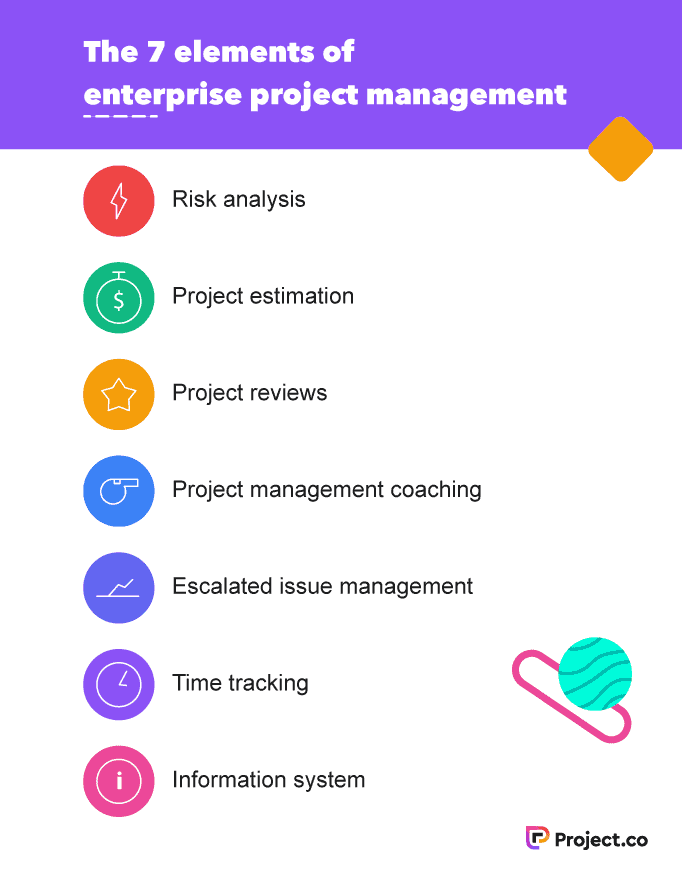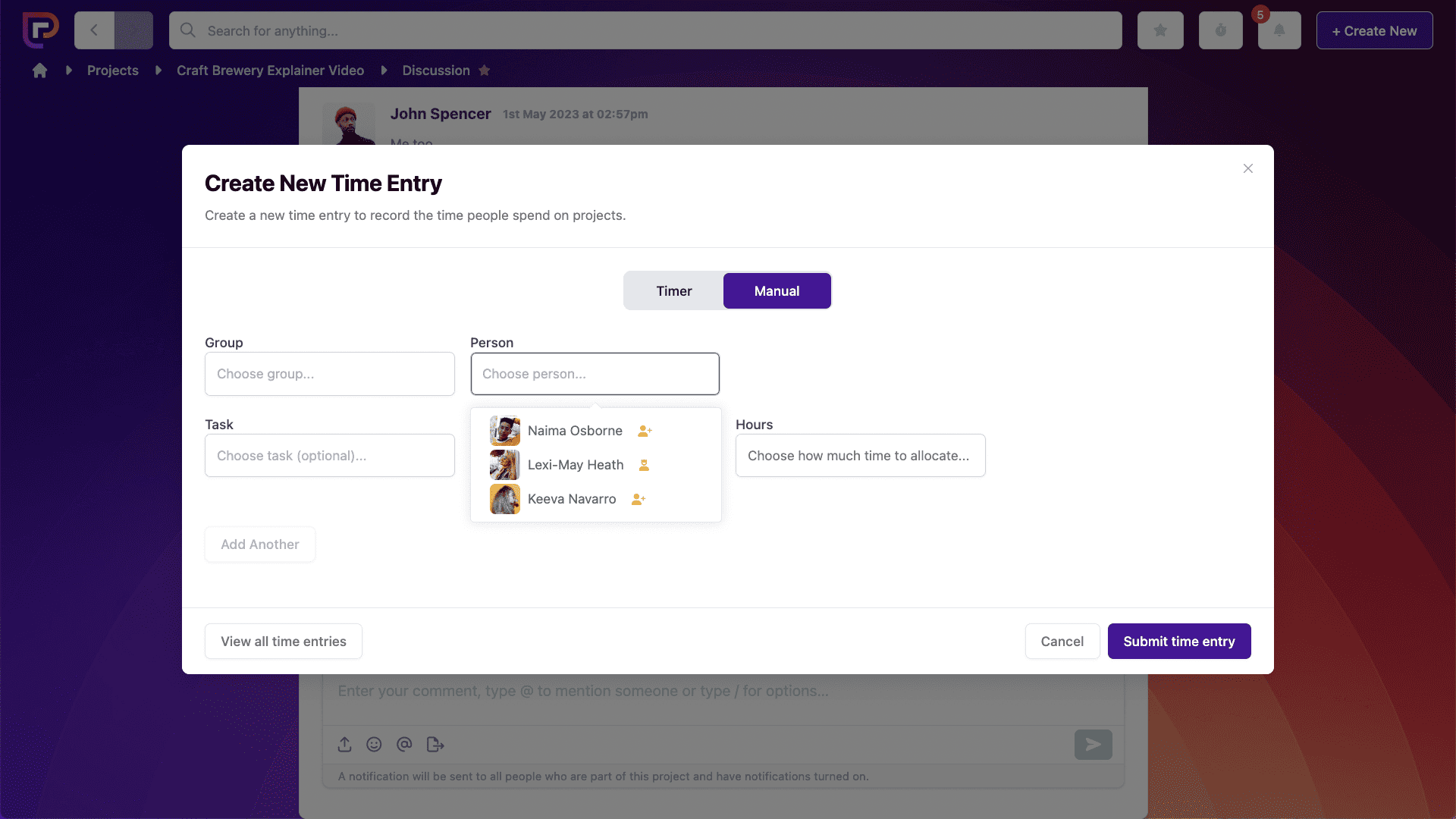Last updated on 27th June 2024
In this article we are going to answer the question: What is enterprise project management?
Project management is such a broad term and it impacts every business in some way or another. And yet, a lot of businesses still struggle to get it right.
Here’s an in-depth look into what enterprise project management is and how to implement it in your business…
What is enterprise project management?
Enterprise project management focuses on the management of projects on a company-wide scale. This usually refers to multiple projects that require standardised processes to make managing them easier and more streamlined for everyone involved.
Enterprise project management is typically implemented by an enterprise project manager. The role of this person is to oversee all of the projects that are occurring in the company at any one time, usually across multiple departments.
The enterprise project manager will monitor projects to see if they are meeting their goals, and may occasionally be required to cancel projects that are under-perfoming. It’s very important for enterprise project managers to be able to tell the difference!
The 7 elements of enterprise project management
According to the Project Management Institute, there are 7 elements of enterprise project management (sometimes referred to as EPM).

Here we’ll take a look at each element in more detail to see why it’s important.
1. Risk analysis
Risk analysis is the process of identifying and analysing potential risks, and then implementing measures that can be put in place to mitigate those risks.
In terms of enterprise project management, this means evaluating what went wrong with past projects and using this information to inform future risk management decisions. Risk analysis should be applied to projects on an individual level, but also to the company as a whole.
A list of potential risks should be made, along with the likelihood of them happening and a contingency plan to mitigate the risks if they occur.
2. Project estimation
Project estimation refers to estimating things like project costs, duration, and resources required. This will help you to determine a standard or “rule of thumb” for your projects. You’ll be able to understand how long projects should take, how much they should cost, what resources you’ll need, and also what revenue you can expect.
3. Project reviews
Reviewing projects is of course a crucial aspect of enterprise project management. We’ve already mentioned how reviewing past projects can help you set new standards for risk analysis and cost estimations, among other things.
Regular reviews of your ongoing projects will help you to keep all of these things in check, and ensure your projects are running efficiently.
Project reports can be really useful to give you a quick overview of the condition your projects are in so you can work more efficiently and be more productive.
4. Project management coaching
As vital as your enterprise project manager will be, they also need to delegate some tasks to the project managers throughout your different teams.
Project management can be a stressful job without the proper coaching and resources, so that’s exactly what this element of EPM is about.
Training can be provided in house by your enterprise project manager or externally using a team of sourced experts. You want to make sure your project managers are trained on project execution, problem solving, and decision making so that they can manage large amounts of projects with more ease.
5. Escalated issue management
Even with a solid risk analysis process in place and well-trained project managers, sometimes issues will inevitably arise that require intervention from upper-level management.
The best way to prepare for these escalated issues is to create a protocol for how to handle them when they do arise. This can include things like what qualifies as an ‘escalated issue’, who should be contacted about it, and how you want to proceed going forward. It may be that escalated issues result in the implementation of wide-scale organisational changes.
6. Time tracking
Time tracking is key for managing projects on an enterprise level. This data allows you to understand how long each section of each project should take, and this can help you with future planning and estimations.
With time tracking being so important for project management in general (both enterprise and not), it may shock you to know that only 34% of people actually use a dedicated time tracking tool.
Time tracking tools, like the one available in Project.co, can save project management teams a lot of time and effort:

Not only that, you can rest assured that the data you’re tracking is accurate and available at your fingertips whenever you need it.
7. Information system
This last element of enterprise project management is probably the most important. When managing everything from risk analysis to time tracking, you need a solid system to store all of your precious information.
A robust enterprise project management tool will allow you to keep all of your important project information in one place.
The perfect platform will give you the opportunity to manage every project individually and also manage your projects together as a whole.
You need a platform that you can personalise and use to communicate with clients and team members alike. Somewhere to keep your files safe and centralised, and also integrate with your most-used tools, like Google Drive. Plus, get access to the reporting insights you need to ensure your projects are profitable and successful. You can get all this and more from Project.co, check it out:
How to implement enterprise project management
1. Define how EPM will be used
Step one is all about personalising EPM to fit your business and individual projects. You’ll need to first define what your objectives are, and then decide who will be in charge of what. This gives you clear goals and also ensures people will be held accountable for each stage of your projects, to give you a better chance of project success.
From there, you can start to define your processes. This might be easier to explain with an example. Let’s say you’re making explainer videos on a large scale. You could have 100 videos moving through your company at any given time.
You’ll need to break this down into smaller processes to understand how each video can be completed on time and on budget. So your processes might be listed as follows: initial meeting with stakeholders, planning meeting, scriptwriting, storyboarding, and so on.
This is just one example but hopefully it gives you an idea of how to define EPM for your business!
2. Communicate with project managers
Once you’ve decided on how enterprise project management will be used in your business, it’s time to communicate that to all of your project managers and team members.
This is a great chance to reflect on the processes that you plan on implementing, and gather feedback from the people who will be working on the projects more closely. They may spot something you’ve missed!
3. Create a plan
After your meeting with stakeholders, you should be in a pretty good place to start solidifying your processes and creating a plan for implementing enterprise project management.
This plan should detail things discussed with your teams, such as any training that needs to take place, technologies that you plan on implementing and/or switching to, and any changes to current teams or responsibilities.
You can roll out your implementation plan over time to make it easier on your teams, and also to allow you to check in on everything routinely to ensure all is going to plan.
Creating a project management plan will help you to be more organised and reduce the possibilities of things going wrong during implementation.
4. Utilise a project management technique
As you’ve probably realised by now, there’s no universal application for enterprise project management. It will look different from company to company, and depend on the type of projects you run, your goals, your resources, and all the other things that are unique to your business.
But coming up with an enterprise project management plan from scratch can be a monumental task. It can really take some of the load off if you find a project management technique (or project management methodology) that fits your business.
There are lots of different kinds of project management techniques, from Kanban to Waterfall. Finding and utilising one that fits well with the projects you manage can help you stay on track.
5. Make sure you have the right tools
Lastly, you want to make sure you have the right enterprise project management tools so that managing your projects is as easy as it can be.
This is where a good enterprise project management software can help. After all, they’ve been designed especially for this purpose!
The importance of choosing the right enterprise project management software
It’s so important to choose the right enterprise project management software because you could end up relying on this tool so much to help you keep your projects on track. You need something that’s solid, scalable, and reliable.
The right enterprise project management software will allow you to manage all 7 elements in one place. For example, you should be able to review and schedule projects, track time, and so on, all from your project management tool.
The best project management software for enterprise businesses will also make it easy for you to manage multiple projects at once, and be flexible enough to allow for easy collaboration with team members and/or clients.
Benefits of enterprise project management
1. Improve efficiency and reduce errors
With a structured enterprise project management plan in place, your business should quickly improve in efficiency and notice less errors. This is because enterprise project management almost creates a manual or handbook for how to do things in your business – all you have to do is follow that and you’ll be golden!
To show how desperately enterprise project management is needed, only 20% of people actually rate their business’s efficiency as ‘excellent’.
2. Easy to scale
One of the main benefits of enterprise project management is that it’s easy to scale for however many projects you have. The idea is to get your processes in a place where they’re solid and projects can run effortlessly from team to team without issue. From there, it makes it so much easier to manage every project that comes into your business, whether you have 100 on the go or 1,000.
3. Better visibility
Having an enterprise project manager that oversees all of your projects and is in constant communication with team leaders and/or project managers improves your project visibility, and this results in an abundance of benefits.
4. Better project outcomes
When projects run more efficiently it results in better project outcomes. It’s as simple as that! By reducing risks, tracking time, and ensuring communication runs smoothly between departments, you can ensure better project outcomes for your enterprise.
Final thoughts
A final thought to leave you with…
Did you know that 96% of people feel the businesses they buy from have room for improvement when it comes to effective communication and project management?
However, you may also be relieved to know that brands that primarily use a project management tool for client and co-worker communication are more than twice as likely to rate their project efficiency as ‘excellent’ (than those who don’t use a project management tool).
The implementation of an all-in-one project management system can help make enterprise project management so much easier for you.
Check out Project.co today to see for yourself.


